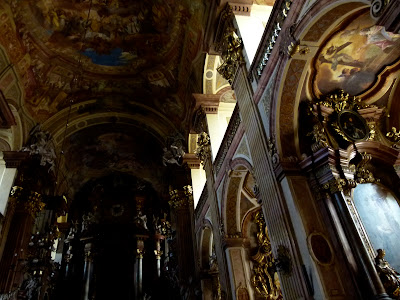Bela Tarr, please make more films?
Not only did I finally get to see some films I also got to see some Polish sites! First off Bela Tarr's latest, and supposedly last, film The Turin Horse was breathtaking. A slow, difficult film that tests an audiences ability to be consumed by the boredom of menial tasks (even more than Jeanne Dielman people!) Turin really forced the huge crowd to remain rapt in anticipation for it's entirety. The film is framed within the context of the quasi historical event in which Friedrich Nietzsche (the philosopher best known for coining the phrase "God is dead.") saw a man whipping a horse which led to his severe mental deterioration and, eventually, to his death. But this is just a lose analogy for the core of the film: Man and God(s) are all debased and the suffering they inflict on everything is inevitable, harsh and will lead to some sort of end. Even the suffering inherent in the stark, mundane, everyday tasks that the film portrays through a father and daughter (the owners of the abused horse Nietzsche witnessed) doing things like cooking potatoes, feeding the horse, retrieving water from the well, become a comment on the horror of human life, of the slow, degrading existence that we are all forced to endure while other forces, such as nature (a constant wind pounds down upon the barren
countryside) or God (who might create those winds) push down upon us too. Shot in lush black and white with a swelling, engulfing string song pulsating underneath, this film is an intense wonder that I recommend but warn of the intentional toughness. Fittingly, a church I went to on the banks of the Odra river here in Wroclaw, just moments before seeing this film, exuded the same sort of tension that I felt during this screening.
A place of worship beseiged by religious persecution and war (during WWII bombs actually dropped on the roof of this church but failed to detonate leaving the ornate architecture intact), the University Church has historically weathered the bottom of humanity, attacked by the worst of human action, human action that strong beliefs had a hand in. I don't want to think things are as bleak as Tarr portrays them but watching this film while seated in a city Hitler had a firm grasp on, watching historical tragedy repeat itself and wars stretch on, I do start to wonder what could, on a mass scale, ever change the destructive nature of mankind and the beliefs he relies upon for guidance? But then, I see this beautiful film and the ornate artistry of the churches here in Wroclaw and I think "THAT is what can save us, that is what has been saving us all this time." So, Bela Tarr, please make another film?
Labels: Film Review




<< Home